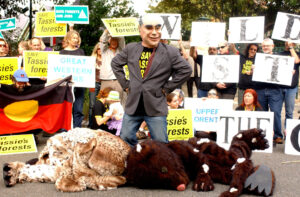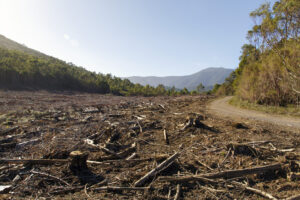NSW minority government is a sign of the times
Elections in New South Wales are always interesting, and this year’s has given us a week of suspense over whether the Minns Labor government would be a minority or majority government.
Australians might be wondering what the difference is, and what it means for the state going forward.
In the Australian political system, governments depend on the “confidence”, or support, of most members of the lower house of parliament.
When one party holds a majority of the seats, this is easy enough – its leader becomes Premier or Prime Minister.
When no party holds a majority of the seats, the Premier or Prime Minister relies on the confidence of one or more crossbench parliamentarians.
Earlier this week, Chris Minns secured the confidence of enough crossbenchers to ensure his Premiership.
What happens now?
The Minns government will need to negotiate with either the Opposition or the crossbench to pass its legislation through the lower house, but a large and diverse crossbench leaves it spoiled for choice: The votes of the Greens or a few of the nine Independents will suffice.
In practice, whether Chris Minns is Premier of a minority or a majority government is unlikely to limit what he can achieve in office.
Some in the media and commentariat still treat minority government as an abnormality, but it is not.
Gladys Berejiklian and Dominic Perrottet both led minority governments, after two Liberals moved to the crossbench pending the results of investigations.
Scott Morrison led a minority government for several months after independent Kerryn Phelps won Malcolm Turnbull’s old seat in a by-election.
These periods of minority government did not stop the governments from seeing out their terms.
A hung parliament does give Greens and Independents more opportunities to influence government legislation and pursue their own amendments and bills.
A point of difference
One area where minority government may make the difference is poker machine policy.
Premier Dominic Perrottet took on the powerful pokies lobby by committing to make every poker machine cashless by 2028, which would make it easier for those harmed by gambling to limit their losses, and tackle the use of these machines for money laundering.
The cashless gaming policy that Labor took to the election was more limited.
The Greens and Independents like Alex Greenwich, Michael Regan and Helen Dalton are strong on gambling reform, and are expected to collaborate to present a united front on the issue.
Reforms possible
NSW has a history of crossbenchers winning lasting reforms.
In the last term, the Independent member for Sydney Alex Greenwich secured successful conscience votes to legalise voluntary assisted dying and decriminalise abortion.
During the Carr Labor government, upper house members negotiated smoking regulations, a ban on duck shooting, the reading of family impact statements at sentencing and limits on the corporal punishment of children.
In the 1990s, a trio of Independents in balance of power signed the Charter of Reform with Liberal Premier Nick Greiner. They secured whistleblower protections, a stronger Auditor-General and Ombudsman, and the introduction of the Legal Services Commission, and – ultimately – forced the resignation of Greiner after ICAC made an adverse finding against him.
Governments are used to negotiating with crossbenchers because most Australian parliaments have two houses, and the government rarely has a majority in the upper house.
In the federal upper house, the Senate, Prime Minister Anthony Albanese needs either Opposition or crossbench support to pass his legislation.
Let’s talk
The numbers are yet to be decided for NSW’s upper house, the Legislative Council, but however they fall, Minns is going to have to negotiate.
Upper houses in Australia require negotiation because they elect a diverse range of parliamentarians.
They are mostly proportional, meaning that groups win seats in proportion to the number of votes they receive instead of the “winner takes all” system in the lower house.
In some jurisdictions – including NSW – elections are staggered, so that only half of the Legislative Council is elected each time. A single election landslide or wipeout cannot totally change the makeup of the upper house.
In the case of NSW, Minns is going to have to negotiate with some combination of the Greens, Animal Justice Party, Legalise Cannabis, One Nation and the Shooters, Fishers and Farmers Party to get his legislation through the upper house.
This allows for alternative points of view to be ventilated and for legislation to be considered from the perspective of voters outside of Labor’s constituency.
It is good that minority governments can be productive and constructive, because Australians can expect more of them in the future.
As mapped by veteran election watcher and politics expert Ben Raue, the vote for major parties in federal elections is at an all-time low, down from about 90 per cent in the 1960s to 69 per cent at last year’s election.
Anthony Albanese scraped a majority with 52 per cent of the two-party preferred vote; Chris Minns will govern in minority despite winning 54 per cent of the two-party preferred.
Minority governments can deliver important and enduring reforms.
When the crossbench holds the balance of power, it can hold up legislation, but that can lead to that legislation being improved – or rejected if it is not up to scratch.
Despite the focus on whether Labor will win majority government, governing in minority has not been an impediment to past reformist governments.
Ultimately, major party leaders need to get comfortable negotiating with independents and minor parties because they are here to stay.
Bill Browne is Democracy & Accountability Program Director at the Australia Institute. Twitter: @Browne90
Between the Lines Newsletter
The biggest stories and the best analysis from the team at the Australia Institute, delivered to your inbox every fortnight.
You might also like
Five priorities for the next parliament if we want a liveable Australia
Climate and nature crises won’t pause while politics plays out.
The pros and cons of minority government with David Pocock and Tony Windsor
Polls point to a power-sharing government being the most likely outcome at the upcoming federal election, but how do they actually work?


